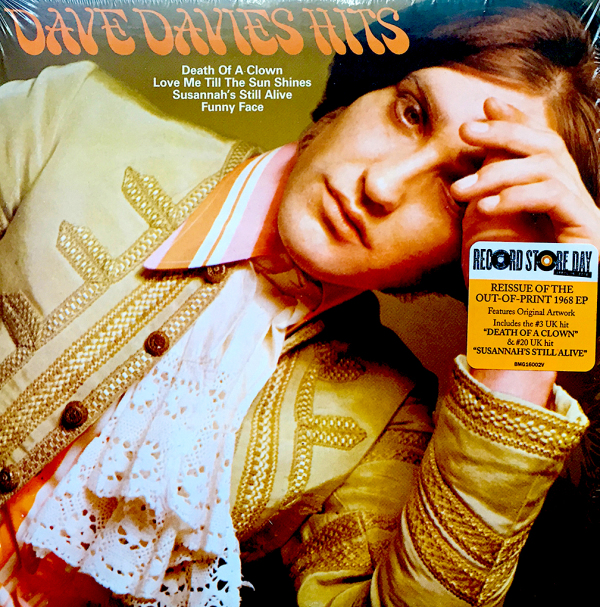 BY JONATHAN VALANIA For anyone under 30, the best way to hear the Kinks’ deathlessly literate, arty, and quintessentially English guitar pop is watching the films of Wes Anderson. Pretty much any one will do – they are all larded with choice cuts indelibly wedded to strikingly precious visual tableaux. The films lend the music a vitality and transgenerational reach that members of the Kinks are no longer capable of. The songs may transcend time, but alas the men who made them cannot.
BY JONATHAN VALANIA For anyone under 30, the best way to hear the Kinks’ deathlessly literate, arty, and quintessentially English guitar pop is watching the films of Wes Anderson. Pretty much any one will do – they are all larded with choice cuts indelibly wedded to strikingly precious visual tableaux. The films lend the music a vitality and transgenerational reach that members of the Kinks are no longer capable of. The songs may transcend time, but alas the men who made them cannot.
Still, I have long been on record attesting to the fact that if the Martians landed their flying saucer on my front lawn and said “What is this thing you call ‘Rock n’ Roll?’” I would play them Dave Davies’ guitar solo in the Kinks’ “You Really Got Me.” And then they would know. It only lasts 15 seconds, but it contains multitudes — riddled with sex and violence, friction and sweat, riot and ruin, it is anarchy in the U.K. bottled and sold 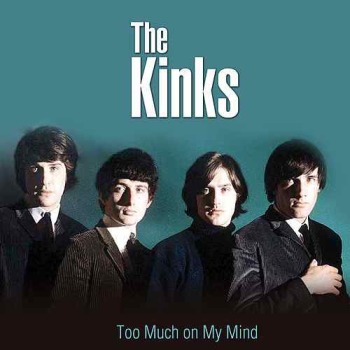 13 years before the official arrival of the Sex Pistols Never Mind The Bollocks. The Kinks augured the impending arrival of the punk the same way they foretold glam, heavy metal and Brit Pop.
13 years before the official arrival of the Sex Pistols Never Mind The Bollocks. The Kinks augured the impending arrival of the punk the same way they foretold glam, heavy metal and Brit Pop.
While Dave gets his props as a blazing guitar-slinger, he has long been overshadowed as a songwriter by his brother Ray — which is a bit like Picasso’s brother and trying to make it as a painter — but the fact is the creative choices he made as a guitarist became so central to the appeal of so many of Ray’s most iconic songs that he should’ve been given co-songwriter credit on songs like “Waterloo Sunset,” “Dedicated Follower Of Fashion,” “Set Me Free” and “So Tired Of Waiting For You,” to name but a few. Likewise, songs like “Strangers,” “Death Of A Clown” and “Susannah’s Still Alive” — all written and sung by Dave Davies — rank near the top of the Kinks’ songwriting hierarchy. Small wonder there is a decades-long sibling rivalry between Dave and Ray that continues to smolder to this day, with both men well into their 70s. Brothers in arms, brothers in harms.
We got Dave on the horn in advance of his performance at Scottish Rite Auditorium on April 9ththat kicks off a US tour in support of Decade, his new-ish collections of unreleased tracks from the 1970s. DISCUSSED: Darjeeling Limited, Konk Studios, The Faces, Wes Anderson, Jimmy Page NOT playing the solo on “You Really Got Me,” slashing the speaker cone of his amp and unwittingly inventing hard rock, nervous breakdowns, why the Kinks were banned from touring America at the height of their powers, Hawaii slack-key guitar, the stroke he suffered in the mid-aughts, the current status of his relationship with is brother and the odds that the two of them will ever mount a proper final Kinks tour before it is too late.
PHAWKER: Let’s talk about Decade, the new album, first.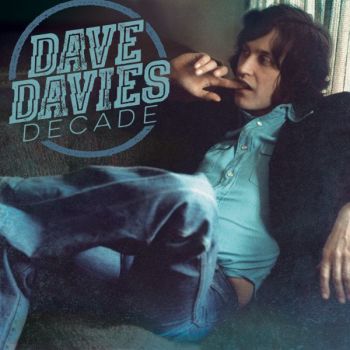
DAVE DAVIES: Oh good, yeah.
PHAWKER: Tell me about this project. These are all unreleased songs from the ‘70s that were selected from here and there? In the attic, in boxes, under mattresses?
DAVE DAVIES: Yeah. My sons, Simon Davies and Martin Davies, helped pull the project together. Simon produced the album. I’m very pleased with the results. It was recorded and made in the ‘70s. We found time in Konk Studio and in various places to record. I always envisaged them coming out someday, but I didn’t know it would be after quite so long.
PHAWKER: Were these songs ever supposed to go on Kinks records and just didn’t make the cut?
DAVE DAVIES: They weren’t really planned to play into that. I didn’t have an agenda at all with it. It was just one of those things that…we had Konk Studio at the time. And we recorded a lot of quick things, going to make some demos and some songs. Listening to it back after all of this time…there are songs that would have fit nicely on some Kinks albums but hindsight is a great thing!
PHAWKER: *laughs* Rolling Stone described Decade as your “nervous breakdown album.” The ‘70s were kind of a rough time, yeah?
DAVE DAVIES: Well that’s interesting because the early 1970s was a pretty difficult time for me spiritually and emotionally. It’s like…’70, ‘72, ‘73…it’s kind of that time where I had a lot of ideas, but I wasn’t really in a good place. I was kind of developing a more spiritual perspective on life. So you could say that, really, t’s about a lot of things…how the world seems and sits in my mind, and what I was going through internally. It’s a very internal record in many respects.
PHAWKER: What can you tell me about that song, “If You Are Leaving”? That one…that’s a really great song!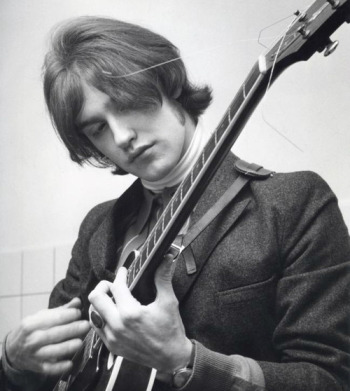
DAVE DAVIES: Of course, thank you! Yeah…it’s kind of a mix of…sometimes you write songs and they might not seem to make sense at first, and then you realize you peeled a few layers off. You realize you’re right about all of the emotions and feelings that you haven’t really addressed properly. That’s one of those songs that reveals those feelings of like…”Maybe I don’t want to be in The Kinks anymore,” or “I want to leave,” Or “Is Ray leaving?” All of those kinds of feelings. So…it’s a song about doubt. What am I doing? Where am I going? What are we doing?
PHAWKER: Do you remember what year that was recorded or written, roughly? Was that the early ‘70s?
DAVE DAVIES: I think it’s early; I bet ya it was ‘73. But it might even be on the liner notes.
PHAWKER: Okay…I’ll have to dig those up. In the age of streaming, it’s so hard to find liner notes. Anyway…the next song I wanted to talk about on the new record is “Cradle to the Grave.” Another really strong track. It has a really strong Faces’ vibe if I’m hearing it correctly…especially your vocals. Were The Faces an inspiration to you? Were you colleagues or friends with them?
DAVE DAVIES: I really liked them. I thought they were a great band. I always thought Stevie Marriott was a very underrated performer, and a great guitar player as well. And it’s hard to kind of pinpoint my influences but, obviously, there’s a lot of music…you can tell my blues influences…and people like Leadbelly and John Lee Hooker. But some of the songs just came out. There wasn’t any kind of agenda, so to speak. Just to get songs done.
PHAWKER: So I wanted to ask you about this song. I only discovered it a few years ago, and I don’t know why it took me so long. But I think it might even be my favorite Kinks song. You wrote it and you sang it. “Strangers”?
DAVE DAVIES: Oh yeah. It’s funny because Decade kind of follows on from those themes of like, “Where are we going? Maybe we have a better chance of, like, sorting the problems out together.” That kind of vibe, ya know?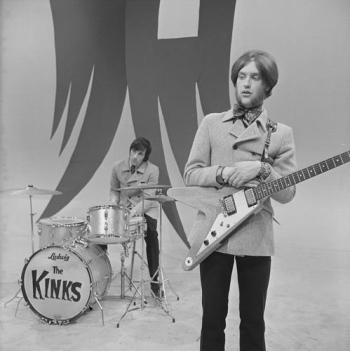
PHAWKER: And that song heralds the onset of the sound of your songs on Decade — less mod and pop and more hairy, unshaven and bleary-eyed. Like everyone in the late ‘60s and early ‘70s.
DAVE DAVIES: Yeah, because there was a lot going on in my inner life. A lot of questions about where I was going. And so it does kind of follow that “Strangers” sounds a lot like “From The Cradle To The Grave” on the new album.
PHAWKER: Yeah. It’s a really, really beautiful song. It has, for my money, your best vocal performance. Like I said, I think that’s as good as any other Kinks song. I put that up there in the all-time top five of great Kinks songs.
DAVE DAVIES: Hey cool man! I love that!
PHAWKER: Don’t tell Ray that. He’ll get mad.
DAVE DAVIES: *laughs* I think he knows it!
PHAWKER: So, one last thing about that song. It was used very effectively in the Wes Anderson film, The Darjeeling Limited. Did you see that film in the theater? You must know the song was used, correct?
DAVE DAVIES: Yeah! I was really pleased that they used The Kinks’s music in that film. They used it in an abstract way as well, which was kind of quirky. The Kinks have always had that sort of quirky, abstract thing. It’s never something straight ahead; it’s always sort of multi-layered or not quite what you think. So I think Wes Anderson did a great job with that, in that film.
PHAWKER: Let me ask you about some Kinks controversies, for lack of a better term. There are pieces of The Kinks’s history that seem to be in dispute, and I just want to hear your side of that. One of them is: Who plays the guitar solo on “You Really Got Me”? There’s this notion of Jimmy Page somehow playing?
DAVE DAVIES: No! That’s a fabricated story; I don’t know where that came from. No. “You Really Got Me” is my guitar sound, my playing…everything is mine on it. So I don’t know where that B.S. came from.
PHAWKER: Well, I’m glad to hear that. I have to say, I think that is the greatest guitar solo in all of rock and roll. I’ve always said that, if the Martians landed today and said, “What is rock and roll?” I would play them that guitar solo.
DAVE DAVIES: Hey man! That’s cool! I don’t mind that!
PHAWKER: Tell me this thing about the knitting needle and poking a hole through the amp speaker to get that super-distorted sound on “You Really Got Me” and “All Day And All Of The Night”?
DAVE DAVIES: I don’t know where that came from. The thing is, I had this little green amp. It’s called an Elpico. I bought it at the store just up the road from where we lived. And I plugged it in, and it sounded just like every other amp. So I got a bit angry with it, and I got a razor blade and sliced the speaker cone up, all the way around. And I didn’t really expect it to work! I plugged it in, played a song…and I was amazed at the sound that came out! And then we perfected it and used it through a bigger amp…like as a preamp type of thing. And…you know…the rest, as they say, is history!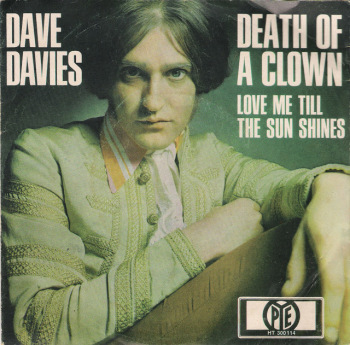
PHAWKER: The reason why The Kinks are purported to have never broken in huge in the United States is because, in the mid-60s, you were banned from touring in the U.S. for reasons that I never understood.
DAVE DAVIES: Yeah. I never really did get to the bottom of it, but our management had some run-ins with the unions in America. I think we didn’t realize how big the unions were. I think they just banned us from getting our visas. Ya know, you can’t play America without Visas. So it was a big thing for us! Three years is a long time in the rock business.
PHAWKER: And you guys were at the height of your power!
DAVE DAVIES: I know…it’s weird. Yeah, we kept that clean with them. Then Ray comes up with these Village Green ideas. And then, we decided…ya know…to go more towards the English. I think, in hindsight, it helped The Kinks focus on music and where we should go. We focused Ray’s writing on the people we grew up with…and about home, really.
PHAWKER: I would agree. And I think there’s this sort of turning inward, and this sort of emphasis on your Englishness. I think it’s part of what makes The Kinks so unique.
DAVE DAVIES: Oh, I agree. I think so. I mean, Ray’s often written about family and the concept of family members. And there are familial characters and stories. Like Muswell Hillbillies and Village Green and characters that we all grew up with. They’re all a bit quirky and a bit odd. They gave us meaningful experiences.
PHAWKER: I wanted to talk to you a little bit about a couple of other Kinks songs that you wrote/sang. The first one is “Susannah’s Still Alive.” Talk with me a little bit about that. What is that about?
DAVE DAVIES: So “Susannah’s Still Alive” is really basically about a girlfriend I had when I was 15. Her name was Sue (or Susan). And she had what they’d call an illegitimate baby girl. And I didn’t see her for a few years because both sets of parents kept us apart. I didn’t see her again, in fact, until she was 30 years old. Obviously, I often thought about her. She sometimes popped up in our songs…like “Funny Face”, and obviously “Susannah’s Still Alive”. And it was this memory that just kept recurring.
PHAWKER: That’s really sad. It gives the song an even more powerful emotional backdrop.
DAVE DAVIES: I think so. Yeah.
PHAWKER: So was it sort of like…maybe you saw her somewhere? Or maybe you heard from someone who’d mentioned that they saw her, or something like that? You didn’t know where she was for years, and then it was like, “Oh, she’s still alive! That’s great!” Kind of like that?
DAVE DAVIES: Yeah, a bit like that. But also, it was kind of a mixture of my feelings for the girl…the baby girl…mixed with my feelings for the mother, whose name was Susan. So, it was kind expressing the feeling of love…wondering where they are and wondering what they’re doing with their lives. That kind of thing.
PHAWKER: So, you didn’t sing this song, but I think it’s one of your great moments as a guitarist. And that’s the song “Holiday in Waikiki.” I really like the slide on that song. Can you tell me about the making of and/or recording of it?
DAVE DAVIES: Growing up playing guitar, me and Pete liked Hawaiian songs. Like, steel guitar and bottleneck and all of that stuff. So there was a song that we used to play a lot that we heard growing up. And it’s a song called “Big Noise from Winnetka”, which has got a little Hawaiian flavor. And then, there was a song out when we were younger called “Hawaiian War Chant.” That was popular in the ‘50s—that Hawaiian slide. There’s even a bass riff on “Holiday in Waikiki” that we borrowed from “Hawaiian War 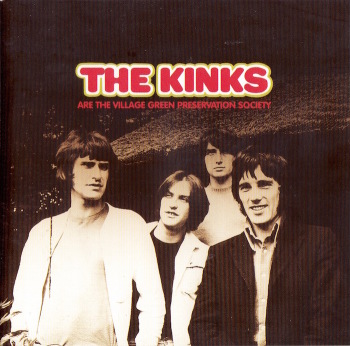 Chant.”
Chant.”
PHAWKER: That music must have sounded very exotic to an English boy in the early ‘60s.
DAVE DAVIES: Oh, of course! It was very influential, really. Because, when we first started playing as The Kinks, one of the places we toured was obviously [mainland] America. But we also went to Hawaii, so there’s obviously been thoughts and feelings from that time as well. We went there and did some shows there early on.
PHAWKER: What about “Death of a Clown”? Great song. Where is that coming from?
DAVE DAVIES: Those were the early days of the ‘60s. You could imagine there were a lot of parties and stuff like that. One night, I came home and felt more like a circus act than a performer. And then I realized the story of the “sad clown.” It’s this clown and he’s really masking his own feelings of despondency and loneliness…all those kinds of things. So that kind of imagery came to my mind. That’s how “Death of a Clown” was brought into being.
PHAWKER: Great song. So…you had a stroke in the early aughts. Could you tell me a little bit about where you’re at? Tell me a little bit about what happened. It’s my understanding that you convalesced for a time. You stayed at your brother Ray’s home and he took you in?
DAVE DAVIES: For a little, yeah. But I spent a lot of time at my sister Dolly’s house. Fortunately, I got back in shape. It was needed. It’s the only way to keep going without difficulty. Yeah, that wasn’t a very pleasant time. But I did learn a lot about myself, how I felt about the world, and my relationships. In a way, as with all of these seemingly negative things, they helped me explore a lot of things we should all be concerned about. How we are, how we treat other people, survival. I learned a lot from that experience.
PHAWKER: I’m assuming that this must have given you some new perspective on your relationship with your brother, Ray.
DAVE DAVIES: Oh, of course! My whole life. Everything in my life.
PHAWKER: You two are very infamous for having a sort of hot and cold relationship. There must have been some sibling rivalry or competitiveness.
DAVE DAVIES: Well, I think a lot of it was brothers being in a band and starting a band. And there was no template or guidebook on how to do it. We always had plenty of ideas and plenty of music. It was mostly inspiration. But obviously brother, family, friends…they clash. It’s not plain sailing by a long way.
PHAWKER: And where is your relationship with him at these days?
DAVE DAVIES: We’ve been hanging out in London. I just got back from London. We’re getting on really well. We’re trying to put some archival recordings together. We’ll see if we get on with that during the summer.
PHAWKER: That Kinks anthology that came out a couple of years ago is fantastic. One of my favorite tracks on there is that alternate, no vocal mix of “Waterloo Sunset.” Your guitar is really high in the mix of the instrumental version of it. It’s really beautiful.
DAVE DAVIES: Thank you! I think that song has a lot of aspects to it or facets. It obviously easily offers a very interesting instrumental. There are many tracks like that on Pete’s stuff and my own stuff that could be an instrumental. It was some interesting stuff.
PHAWKER: Great guitar parts on that. You wrote those leads, right?
DAVE DAVIES: That’s right. Of course, yeah.
PHAWKER: Not to open up any old wounds or dispute you may have had, but I just hope you get your share of the publishing and song credits. I know in the old school way—
DAVE DAVIES: A lot of those things were in the old school way, unfortunately.
PHAWKER: But there’s so much more to a song—
DAVE DAVIES: Well, absolutely. I’m very aware of production and arrangement. I’ve always felt that the arrangement side of things is really important: where things go, placement, stuff like that. That’s very important.
PHAWKER: Any of those iconic songs…if even one element was not there, it probably would not be an iconic song…ya know?
DAVE DAVIES: I totally agree. I think that’s absolutely right. People that are there and the people that contribute ideas and feelings…all of that makes it come together. The old school idea of it doesn’t cut it anymore.
PHAWKER: They really do need to rewrite the copyright laws and figure out how to credit people.
DAVE DAVIES: I think younger musicians and younger bands have learned from our mistakes. When you are in a band, you participate in everything. You participate in making music. So you should participate in the rewards.
PHAWKER: I think that’s what a lot of younger bands do. They split everything four ways and it avoids a lot of conflict.
DAVE DAVIES: Yeah. Young guys learned from us, I guess.
PHAWKER: When was the last time you played live with Ray? Is there any chance you two will 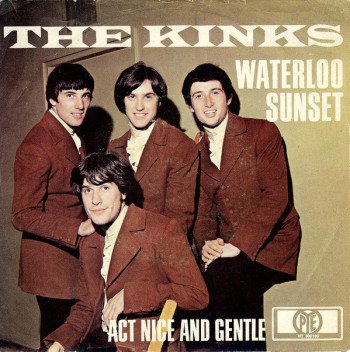 do any touring or concerts together in the future?
do any touring or concerts together in the future?
DAVE DAVIES: We don’t play yet because we are going to work on these Kinks archives and see how we get on with that. Ray played with me in London at a concert about three years ago. He came onstage at the end for “You Really Got Me” and we thought, “Oh, maybe we should try and do something.” We’re still in the talking stage, I’m afraid. But who knows.
PHAWKER: But never say never, right? It could happen, right?
DAVE DAVIES: Absolutely.
PHAWKER: So this archive project that you’re talking about…what is it?
DAVE DAVIES: These are old Kinks tracks. Some of them…we never finished. Some need tidying up. We’re at different stages of developing them. So that’s something we want to try and work on if we can.
PHAWKER: Do these songs span the entire career? Or are they just ‘60s songs?
DAVE DAVIES: There’s a couple Decade things and then ‘80s tracks. So, we’re still going through them.
PHAWKER: Are you living in the U.K. these days?
DAVE DAVIES: I live in the U.K. but I spend a lot of time in the States. My girlfriend lives in America, in New Jersey. I’m back and forth between London and America. I have children that grew up in California. I lived there for ten or so years. I have connections all over the States. But obviously, London is my home.
DAVE DAVIES @ SCOTTISH RITE AUDITORIUM COLLINGSWOOD NJ APRIL 9TH

